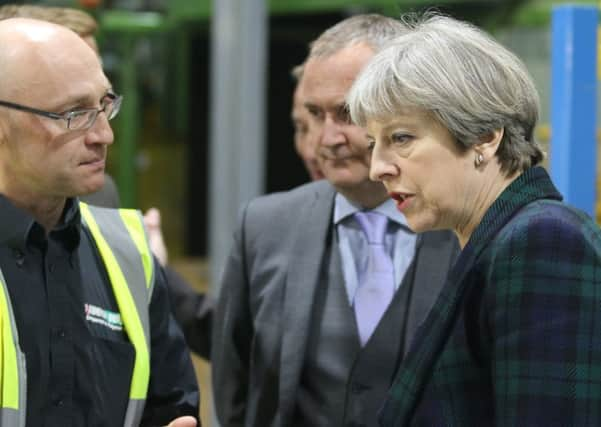Lord Haskins: The Brexit battle ahead means Theresa May should keep Tory manifesto vague


It will probably endorse the government’s intention to withdraw from the European Union, with incalculable economic and political impacts. It could lead to a second referendum in Scotland, thereby endangering the Union. It could bring the Irish question back onto the agenda as the process of economic integration of the island is put into sharp reverse. And it could see the demise of a century-old political institution – the Labour Party.
It seems possible that Mrs May will easily win the election, so the responsibility for dealing with all these issues – except of course the Labour Party – rests with her. To that end, the contents of the Conservative manifesto are of immense importance.
Advertisement
Hide AdAdvertisement
Hide AdParty manifestos outline future policy commitments, which tend to be honoured by the victorious party in government. Only recently the Chancellor, Philip Hammond, was forced to withdraw a tax proposal from his budget because of a commitment made by George Osborne in the 2015 election manifesto.
Mrs May will be under severe pressure from the ardent Brexiteers to withdraw unconditionally from the obligations the country has to the European Court of Justice, to leave the Single Market, to exit the EU customs union and to impose strict controls over EU workers in Britain. The hardliners might also want to include in the manifesto a rejection of any divorce payment, which would be totally unacceptable to the other 27 countries.
At the same time most businesses are keen to maintain the maximum access possible to the Single Market which would require compromises with regard to the European courts, the Customs Union and the free movement of workers. Many industries and institutions would find themselves in severe difficulties if the flow of workers from the EU was put in jeopardy.
So Mrs May would be well advised to avoid watertight commitments in her manifesto on these issues, because they would bind her hands on the forthcoming negotiations. Indeed, if the baseline Brexiteers had their way there would be no point in entering into negotiations, because the other countries would say there is nothing to negotiate. As a result, and this is what some of the more reckless Brexiteers would want, Mrs May would have no choice but to step off the cliff and leap into the unknown.
Advertisement
Hide AdAdvertisement
Hide AdA clean break of this scale would trigger serious tariff barriers between the UK and the EU, as much as 40 per cent on clothes and food. Britain would also have to withdraw from all the global trade deals the EU has entered into. The City of London would be denied easy access to the EU. The motor and pharmaceutical industries, cornerstones of the economy, would face major restrictions of their supply chains, with inevitable mass transfers of jobs from here to Europe.
The Prime Minister’s rhetorical messages – “Brexit means “Brexit” and “We will leave the Single Market” may already be limiting her negotiating wriggle room – but they seem designed to placate her right wing rather than to define her negotiating position.
So the manifesto must give her plenty of scope to negotiate and achieve compromise with the EU. In particular, a deadline for completion of the withdrawal process by March 2019 is impractical. The agenda is daunting. First there is a £60bn wrangle over the divorce settlement. Next the impact of every sector of the economy will have to be taken into account in the settlement.
Extensive non-tariff arrangements such as regulations covering health and safety and employment will have to be examined in detail. Some 80,000 regulations will have to be reviewed.
Advertisement
Hide AdAdvertisement
Hide AdAnd, as there is a real possibility that negotiations break down because of intransigence on both sides, a Plan B for exit must be in place. David Davis recently admitted that no such plan exists which suggests that either he will have the wriggle room to do a deal or that he is burying his head in the sand.
I believe that the Prime Minister, David Davis and their advisors are well aware of these issues and of the historic consequence of failure. Her objective must be to win a sufficiently large but flexible mandate from the electorate that she is not beholden to the more extreme Brexiteers and able to make compromises.
From a political and business perspective, this must be the way to minimise the impact of withdrawal. And who knows, by the end of the transition the EU may have reformed itself sufficiently to make concerns about relations with the rest of the EU a non-event.
Lord Haskins of Skidby is a cross-bench peer and the former head of Northern Foods. He is chairman of Humber LEP.